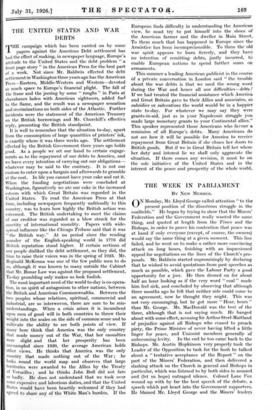THE "UNITED STATES AND WAR DEBTS
THE campaign which has been carried on by some • papers against the American Debt settlement has had the effect of making, in newspaper language, Europe's attitude to the United States and the debt problem " front page story " in the American Press for the best part of a week. Not since Mr. Baldwin effected the debt settlement in Washington three years ago has the American Press—Eastern, Middle-Western and Western—devoted so much space to Europe's financial plight. The fall of the franc and the jeering by some " roughs " in Paris at charabancs laden with American sightseers, added fuel to the flame, and the result was a newspaper sensation and recriminations on both sides of the Atlantic. Further incidents were the statement of the American Treasury on the British borrowings and Mr. Churchill's effective reply, presenting the British standpoint.
It is well to remember that the situation to-day, apart from the consumption of large quantities of printers' ink, is exactly where it was three weeks ago. The settlement effected by the British Government three years ago holds good. As a people we set our hand to certain engage- ments as to the repayment of our debts to America, and we have every intention of carrying out our obligations— whatever may be said to the contrary. It is not our custom to enter upon a bargain and afterwards to grumble at the cost. In life you cannot have your cake and eat it. When the funding negotiations were concluded at Washington, figuratively we ate our cake in the increased esteem with which, Great Britain was regarded in the United States. To read the American Press at that time, including newspapers frequently unfriendly to this country, was to learn how highly the British action was esteemed. The British undertaking to meet the claims of our creditor was regarded as a blow struck for the sanctity of international morality. Papers with wide- spread influence like the Chicago Tribune said that it was " the British way." At no period since the rending asunder of the English-speaking world in 1776 did British reputation stand higher. If certain sections of our people disliked the debt settlement, as they did, the time to raise their voices was in the spring of 1923. Mr. Reginald McKenna was one of the few public men to do so, although it was known to many outside the Cabinet that Mr. Bonar Law was against the proposed settlement. To-day grumbling only makes us look foolish.
The most important need of the world to-day is co-opera- tion, in no spirit of antagonism to other nations, between the British and American Commonwealths. Between the two peoples whose relations, spiritual, commercial and industrial, are so interwoven, there are sure to be mis- understandings. When a crisis arises it is incumbent upon men of good will in both countries to throw their weight into the scales on the side of common sense and to cultivate the ability to see both points of view. If many here think that America was the only country that made money out of the War, that her casualties Were slight and that her prosperity has been unexampled since 1920, the average American holds other views. He thinks that America was the only country that made nothing out of the War ; he looks round the world map and observes that large territories were awarded to the Allies by the Treaty of Versailles ; and he thinks John Bull did not fare so badly. He does not understand that we took over some expensive and laborious duties, and that the United States would have- been heartily welcomed if they had agreed to share any of the White Man's burden. If the European finds difficulty in understanding the American view, he must try to put himself into the ,:shoes of the American farmer and the dweller in Main Street. To theni much that has happened in Europe since the Armistice has been incomprehensible. To them the- old war spirit appears to burn fiercely, and they have no intention of remitting debts, justly incurred, to enable European nations to spend further sums on armaments.
This summer a leading American publicist in the course of a private conversation in . London said 4 the trouble about the war debts is that we used the wrong word during the War and hence all our' difficulties—debts,! If we had treated the financial assistance which America and Great Britain gave to their Allies and associates, as subsidies or subventions the world would be in a happier state to-day. For whatever we may say they were grants-in-aid, just as in your Napoleonic struggle you made large monetary grants to your Continental allies." This speaker represented those Americans who favour a remission of all Europe's debts. Many Americans do not see how it will be possible for America to receive repayment from Great Britain if she closes her doors to British goods. But if we in Great Britain tell .her where her duty and interest lie we shall only aggravate the situation. If there comes any revision, it must be on the sole initiative of the United States and in the interest of the peace and prosperity of the whole world.


































 Previous page
Previous page